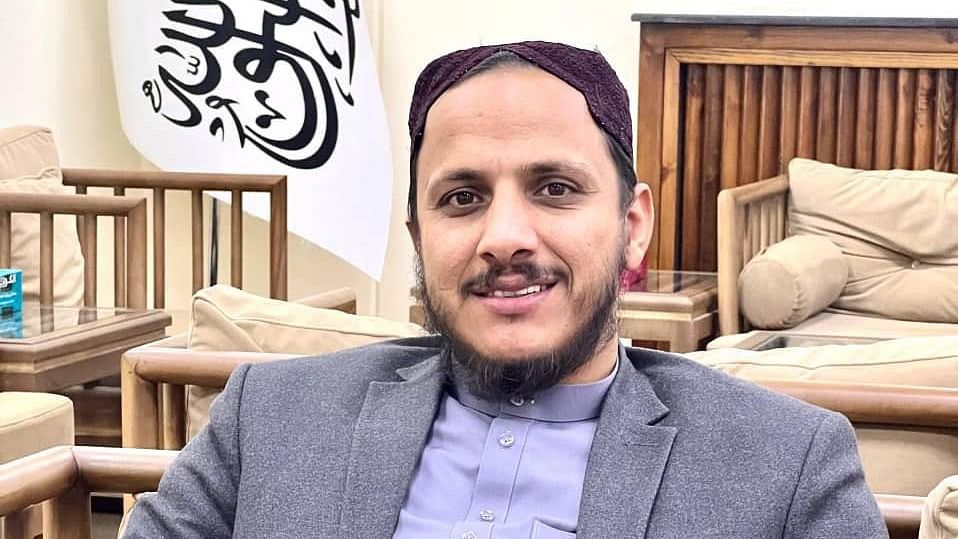
Ikramuddin Kamil
Credit: X/@MJalalAf
New Delhi: Just days after New Delhi sent a senior diplomat to meet the top brass of the Taliban in Kabul, the Sunni Islamist organisation’s regime in Afghanistan has for the first time appointed a representative to India.
The Ministry of Foreign Affairs of the Taliban’s so-called government in Kabul conveyed to New Delhi that it would appoint Ikramuddin Kamil as the acting head of the consulate of Afghanistan in Mumbai.
The move came less than a week after a senior diplomat of India led a delegation to Kabul and met Afghanistan’s “acting defence minister”, Mullah Muhammad Yaqoob, the son of Taliban’s late founder Mullah Muhammad Omar, as well as the other leaders of the so-called government the Sunni Islamist organisation established after returning to power in the conflict-ravaged country in 2021.
J P Singh, joint secretary at the Ministry of External Affairs (MEA) in New Delhi, also met the senior officials of the UN agencies and former Afghan president Hamid Karzai in Kabul last week.
Over the past three years since the return of the Taliban to power in Kabul, Afghan diplomats manning the Afghan Embassy and Consulates in India have sought refuge/asylum in different Western countries and have left India. A lone former diplomat, who has continued to stay in India, has somehow kept the Afghan Mission/Consulates running.
Ikramuddin Kamil, whom the Taliban appointed as the acting consul, did his PhD from South Asian university on a scholarship from the Government of India. He has agreed to function as a diplomat in the Afghan Consulate in Mumbai as more staff was needed to provide consular service to the citizens of that country living in India.
“As far as his affiliation or status is concerned, for us, he is an Afghan national working for Afghans in India,” a source in New Delhi said.
“As regards the issue of recognition, there is a set process for recognition of any Government and India will continue to work with the international community on this issue,” said the source.
India, like the US and most of the other nations, has not yet recognized the government of the Islamic Emirate of Afghanistan set up by the Taliban in September 2021. But its outreach to the Taliban is apparently aimed at stopping Pakistan and its “all-weather iron-brother” China from turning the Sunni Islamist group’s return to power in Afghanistan into a strategic advantage against India.
The diplomats of the Embassy of the Islamic Republic of Afghanistan in New Delhi refused to pledge loyalty to the new regime in Kabul for more than two years after the Taliban’s return to power in Kabul in August 2021.
However, nearly two-and-a-half years later, Farid Mamundzay, Kabul’s envoy to New Delhi, on November 24, 2023 posted on X a statement, announcing the “permanent closure” of the embassy of the Islamic Republic of Afghanistan with effect from the previous day. He alleged that he and his colleagues had decided to shut down the diplomatic mission in New Delhi in view of the “persistent challenges” from the Government of India.
A few hours after Mamundzay, who has been living mostly in the United Kingdom after the change of regime in Kabul, posted the statement on X, the heads of the two consulates of Afghanistan in Mumbai and Hyderabad in western and southern India, Zakia Wardak and Sayed Mohammad Ibrahimkhil, issued a joint statement, claiming that they had taken control of the embassy in New Delhi. Like Mamundzay, Wardak and Ibrahimkhil had also been appointed by the erstwhile Afghan Government led by Ashraf Ghani. But Deputy Minister for Foreign Affairs of the Taliban’s Government in Kabul, Sher Mohammad Abbas Stanekzai recently said that he was in touch with the two consular officials, who had taken over the leadership of the embassy in New Delhi.
New Delhi reached out to the first family of the Taliban in Kabul on Wednesday even as the relations between Afghanistan and Pakistan hit a new low over the past few months. Islamabad has been accusing the Taliban government in Kabul of providing sanctuaries to the terrorists of the Tehreek-e-Taliban Pakistan (TTP) in Afghanistan.
